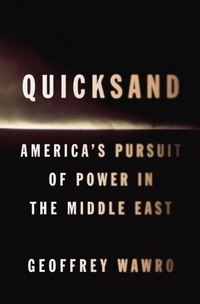

Purchase
Penguin
April 2010
On Sale: April 1, 2010
704 pages
ISBN: 1594202419
EAN: 9781594202414
Hardcover
Add to Wish List
Non-Fiction
An unprecedented history of our involvement in the
Middle East that traces our current quandaries there-in
Iraq, Israel, Iran, Afghanistan, and elsewhere-back to their
roots almost a century ago.
Geoffrey Wawro
approaches America's role in the Middle East in a
fundamentally new way-by encompassing the last century of
the entire region, rather than focusing narrowly on a
particular country or era. The result is a definitive and
revelatory history whose drama, tragedy, and rich irony he
relates with unprecedented verve. Wawro combed archives in
the United States and Europe and traveled the Middle East to
unearth new insights into the hidden motivations, backroom
dealing, and outright espionage that shaped some of the most
tumultuous events of the last one hundred years. Wawro
offers piercing analysis of iconic events from the birth of
Israel to the death of Sadat, from the Suez crisis to the
energy crisis, from the Six-Day War to Desert One, from
Iran-contra to the wars in Iraq and Afghanistan and the rise
of al- Qaeda. Throughout, he draws telling parallels between
America's past mistakes and its current quandaries, proving
that we're in today's muddle not just because of our old
errors, but because we keep repeating those errors.
America has juggled multiple commitments and conflicting
priorities in the Middle East for nearly a century. Strands
of idealism and ruthless practicality have alternated- and
sometimes run together-in our policy. Quicksand
untangles these strands as no history has done before by
showing how our strategies unfolded over the entire century
and across the entire region. We've persistently misread the
intentions and motivations of every major player in the
region because we've insisted on viewing them through the
lens of our own culture, hopes, and fears. Most
administrations since Eisenhower's have adopted their own
"doctrine" for the Middle East, and almost every doctrine
has failed precisely because it's a doctrine-a template into
which events on the ground refuse to fit. Geoffrey Wawro's
peerless and remarkably lively history is key to
understanding our errors and the Middle East-at last- on its
own terms.
Comments
No comments posted.
Registered users may leave comments.
Log in or register now!
| 


 © 2003-2025 off-the-edge.net
all rights reserved Privacy Policy
© 2003-2025 off-the-edge.net
all rights reserved Privacy Policy